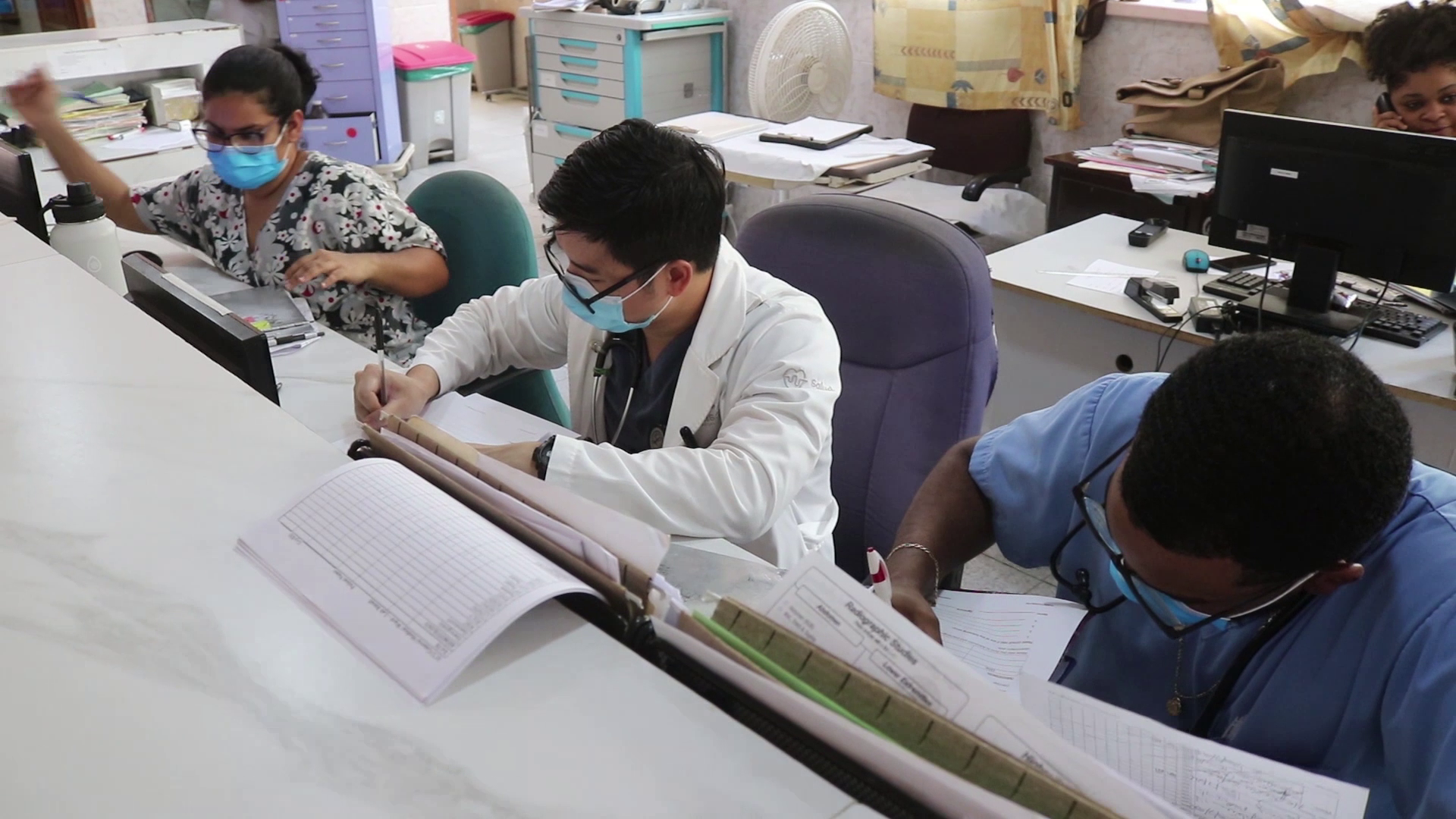Working in the healthcare sector as a medical doctor can be very challenging, especially in Belize where resources are sometimes very scarce. So, when medical students return home after spending five years or more receiving their academic certification, they must undergo a sort of indoctrination into Belize’s healthcare system. The proper term is medical internship or residency. Any medical doctor wanting to practice in Belize must participate in the Ministry of Health and Wellness’ one-year Medical Internship Program. Upon completion of the program, they receive their license to practice medicine in Belize. Today, News Five’s Paul Lopez visited the Karl Heusner Memorial Hospital to find out more about how the program is contributing to the improvement of healthcare services in Belize. Here is that report.
Paul Lopez, Reporting
Seven hundred staff members work within the four walls of the Karl Heusner Memorial Hospital. K.H.M.H. has the largest population of employees under one roof in the country. This is where doctors who desire to practice in Belize do their internship or residency to receive their medical license.
Dr. Gerald Castillo, Medical Intern, K.H.M.H.
“It has been a building process.”
Dr. JonMarie Young, Medical Intern, K.H.M.H.
“We get to practice procedures, be in surgeries, we get a lot of hands-on experience.”
Dr. Aaliyah Abraham, Medical Intern, K.H.M.H.
“It is just as important as the theoretical part, because you can know the theory but if you don’t know how to do what you need to do then that is difference between saving a person and causing more harm.”
John Waight has been the coordinator of the Ministry of Health and Wellness’ Medical Internship Program since its inception just over a decade ago. A hundred and eighty-two interns have completed the program under his tutelage. That is just over thirty percent of five hundred and sixty-three medical doctors that are currently licensed to practice in Belize.
Dr. John Waight, Coordinator, Medical Internship Program
“It is a period of further training which is designed to prepare the recently graduated medical doctor for safe and independent practice in the nation on Belize, the emphasis is Belize, because medicine does vary more than a little bit from place to place and the idea is to prepare these doctors who have completed their university degrees for safe, that they do no harm and independent, when they go through the door they are on their own and can function as a medical officer for example in the public service or they can work as a primary care doctor in one of the NHI clinics or they can even open their own private clinics and see patients.”
Dr. Gerald Castillo
“For there the different patients we don’t even see them because they go straight to the specialist clinics. But here we are the ones that have to see those patients and manage and treat. So, with that it has been a great experience to know how Belize does management for those patients.”
“What does it do for your confidence as a doctor?”
Dr. Gerald Castillo
“Oh, it skyrockets it.”
“There are four major services in the hospital, medicine, surgery, obstetrics and pediatrics and they spend three months in each. The medical service includes a short stay in emergency medicine and accident and the surgical is divided into orthopedic surgery and general surgery. Obstetrics is obstetrics and pediatrics is the neonatal unit. What do they do, when assigned to the given service, they are the primary doctors dealing with the patients.”
Paul Lopez
“One would consider it alright, if we study overseas, perhaps we are unequipped to expose them to that level of training.”
“Well, you hit a cord, when I came back here a long time ago, my supervisor said, John you will do well in Belize, because you can improvise. We have made strides, but it is not quite like that, but at times you do have to improvise. That is one thing.”
“I would think it has more to do with the social aspect of the country how women are being pushed more to get an education, to be more independent, versus men, maybe men have more pressure to sustain their families from a very early age. I think there is a lot more socio-economic factors relating to that.”
Each of these doctors have a different story on how life led them to engage the field in which they are currently employed, but in speaking with them, they all shared a similar vision, to improve the healthcare system in Belize. This is evident in Doctor Aaliyah Abraham, the first medical practitioner in her family.
“Sometimes they tend to say that it is the nurses that are more compassionate towards them.”
Paul Lopez
“How much pride do you take in compassion?”
Dr. Aaliyah Abraham
“A lot, because that is when you find your patient will be freer with the information they have to offer, and it will help you to diagnose and help to treat them.”
Reporting for News Five, I am Paul Lopez.
